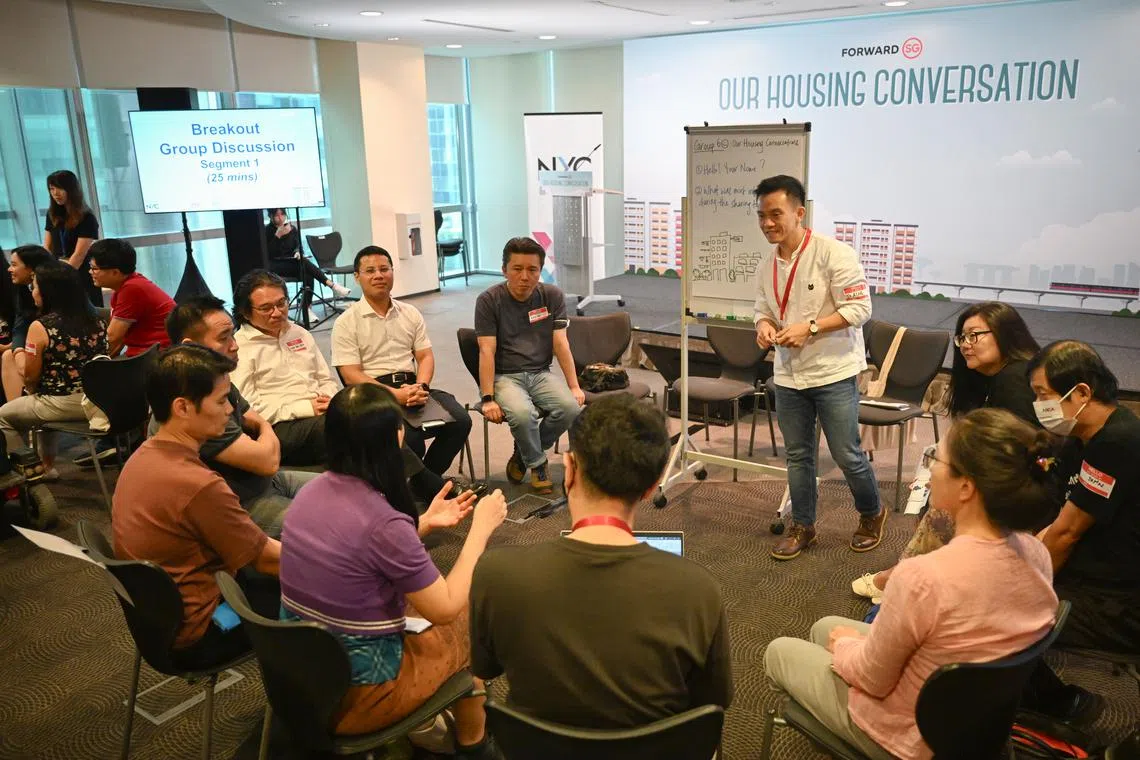More equitable access to housing types for singles being studied: Desmond Lee
Sign up now: Get ST's newsletters delivered to your inbox

National Development Minister Desmond Lee (in white, short-sleeved shirt) with participants on July 30 in the ongoing exercise to engage Singaporeans on their housing needs and aspirations.
ST PHOTO: SHINTARO TAY
SINGAPORE - Suggestions for more equitable access for singles to housing types across mature and non-mature estates and prime locations will be studied, as well as other ideas that emerged in the Forward Singapore exercise, National Development Minister Desmond Lee said.
Speaking on Sunday to about 90 participants in the ongoing exercise to engage Singaporeans on their housing needs and aspirations, he noted that while home ownership was a strong theme in discussions with various groups of singles and second-time buyers, “their circumstances varied greatly, and the needs are very diverse”.
“We know that if we leave everything to market forces, and only provide a rental social safety net, we will become like other cosmopolitan, successful cities, but also inherit the same housing woes they have... where home ownership is dismal and rental stresses mean that landlords determine the fate of tenants.”
To address affordability concerns, some ideas being considered include a variation of “rent-to-own” models – where tenants have the option to buy the property they are renting after some time – and the possibility of buying flats sold with shorter leases. This is to cater to some singles who may wish to rent initially because of financial reasons, or for flexibility.
Mr Lee said: “We continuously identify where the social compact lies. It is very clear that our society is evolving. People are getting married later, having fewer, if any, children, and more are remaining single. We are also seeing increasing transnational families. These are the trends that are here to stay... but we must get a feel of the pulse and make adjustments along the way.”
He added: “We spend a lot on public housing and are committed to spend more, if necessary, to keep public housing affordable, accessible and inclusive, in response to social changes. But we must also make sure our land resource and carbon constraints are featured in our calibrations, and that any decision we make today must be something that can be sustained well into the future.”
Issues discussed on Sunday included concerns over singles being barred from buying new prime location public housing (PLH) flats
The PLH model imposes stricter buying and selling conditions on flat owners
Other housing types under consideration include co-living, or housing with shared communal facilities.
“Some also discussed inter-generational housing, where the young and old can interact in shared communal spaces, while maintaining their own private living spaces. This could take the form of inter-generation housemates where the young and old share a unit, or inter-generation blocks or estates, where there is a good mix of Singaporeans across ages, with communal spaces to mingle,” Mr Lee added.
Under the rent-to-own model, renters would pay a non-refundable option fee upfront for the option to purchase the property subsequently. Part of their monthly rental could go towards paying for the property, which will help lower the purchase price when it is time to exercise the option to purchase, the Ministry of National Development said.
One of the participants at Sunday’s session, Mr Muhamad Tassri, 27, who owns a company selling mental health products, said he likes this model because it would help lower the upfront costs of buying a property.
For second-timers, Mr Lee said some may have started out with smaller homes, but now require larger homes to accommodate a growing family. Others, such as empty-nesters, may wish to right-size to a smaller unit, while those who have fallen on hard times may require stronger support to buy homes again, he added.
For this group of second-time home buyers, the challenge is extremely high demand from first-timers, he pointed out.
“Due to the pandemic, many advanced their (housing) applications, so demand from first-timers shot up, coupled with the fact that we are putting out (many) more (flats in) attractive locations, which induces demand. But they are legitimate first-timers because they have never bought public housing from the Government.”
Mr Lee said this supply-demand imbalance would be corrected in time. Meanwhile, second-timers who require greater support for a second chance at owning a flat can get help from several schemes, such as the Assistance Scheme for Second-Timers for divorced or widowed parents with young children, and the Third Child Priority Scheme for larger families with three or more children.
The Forward Singapore exercise, which focuses on shaping Singapore’s future and social compact, has engaged over 16,000 Singaporeans since it was launched in June 2022.
Now in the final phase, it will conclude in the second half of 2023 with a report, and the ideas heard may be incorporated in the Urban Redevelopment Authority’s next draft master plan.



